DEFEAT YOU HAND TO YOUR OPPONENT, VICTORY YOU CREATE YOURSELF
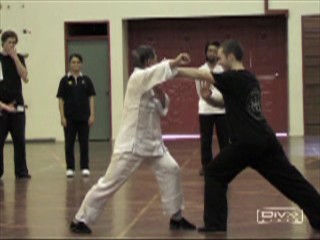
The Old Fox and the Young Tiger
The low level of sparring today compared to that in the past is obvious even when we only examine how martial artists make their first moves in attack and defence. Not only attackers do not prepare themselves well for advantages, they frequently give away disadvantages of themselves to their opponents -- what we call free-offers. But their opponents are often ignorant of these free-offers, thus they fail to exploit them.
Both attackers and defenders do not understand the value of an important principle Sun Tzu advises in his famous “Art of War”. This great strategist says:
Defeat you Hand to your Opponent
Victory you Create Yourself
In other words, if you give free-offers to your opponent, you hand your defeat to him, without him having to do extra work. For example, if you move in and swing your hand backward high in the air to prepare for a swinging punch forward, you give him an easy openning. He just thrusts a straight punch into your face, or worse thrusts his fingers into your eyes or throat.
In the same way, if our opponents give us disadvantages of themselves, we exploit their free-offers and defeat them without having to do extra work because they hand their own defeat to us. Some examples of such free-offers are careless exposure, poor balance, awkward posture and hesitation in action. Actually such free-offers are common in today's low level sparring. What you need to do is to be aware of them and be trained to exploit them.
But if our opponents are well trained, they would not give away free-offers. In this case we have to create advantages for ourselves. This can be realized through effective use of tactics and strategies, which have been frequently explained in our lessons. Some examples are feint moves, turning the opponents' momentum against themselves, and pressing attacks.
As it has been often emphasized, what we learn in our kungfu lessons can be directly transferred to our daily life. If, for example, you are frequently late for work or slow in your assignments, your boss is unlikely to choose you for a promotion. You have handed in your own defeat. On the other hand, if you show initiative in your work and consideration for others in your relationship, you will be a likely choice when a promotion is available. You create your own victory.
Advanced Footwork in Immortal
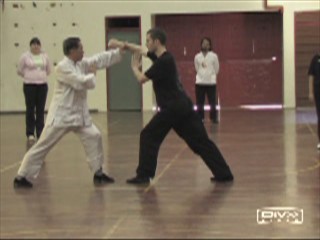
At first students retreat their back leg when applying “Immortal Emerges from Cave” to counter an opponent's “Hang a Golden Star in a Corner”. When they are proficient in this, they can progress to using a more advanced form of footwork where they move half a step backward and half a step forward. This gives some advantages in countering, but is more risky. In this version it is important to have your guard hand ready.
Instant Change
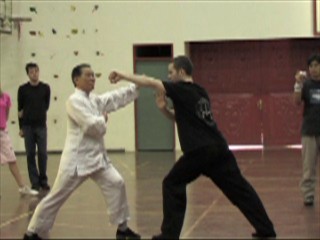
If you make a mistake in your response, instantly change to the correct response. For example, if your opponent executes a left horn-punch but you respond wrongly because you mistakenly judge it to be a right horn-punch, don't freeze. Just change instantly to the correct response. Initially you may hesitate for a second or two, but gradually through systematic training you can make the change instantly.
Tricking your Opponent
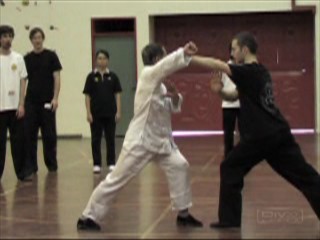
First, Grandmaster Wong makes a side attack and Sifu Jamie responds correctly. Then Grandmaster Wong tries to trick Sifu Jamie by making a feint move, followed with a real attack. But Sifu Jamie responds correctly too.
Old Fox and Young Tiger

There is a Chinese saying that even a young tiger, despite his power and courage, may be unable to match an old fox due to his cunningness. First, Grandmaster Wong pretends to trick Sifu Jamie, and Sifu Jamie responds correctly. Then Grandmaster Wong really tricks Sifu Jamie, and he falls prey to the trick, causing much laughter. Be careful of the old fox.
Good Footwork to the Rescue
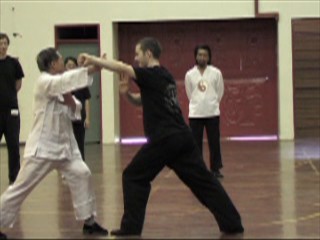
If your footwork is good, even when you make a mistake or when you have been tricked, you may not be hurt. But you still neutralize the attack even when you may be slower. This is to prevent your opponent from following up with another attack. If he moves his head forward to try to narrow the gap you have created by your moving back, you can strike him.
Correct Angling is Important in the Immortal Pattern
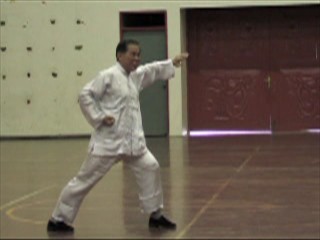
Moving your hand out at a correct angle is important in executing “Immortal Emerges from Cave”. Students commonly make the mistake of moving the hand out at 20 degrees or 80 degrees instead of at 45 degrees. The hand should be extended out; it is also not necessary to “salute” the opponent.
Advantages of Poise Pattern
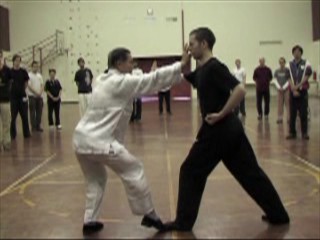
Adopting a poise pattern in your defence while an opponent attacks, gives you various advantages. When the opponent moves in, you can strike him before he initiates his attack. The Four-Six Stance would be useful in such a situation.
Common Mistakes while Attacking
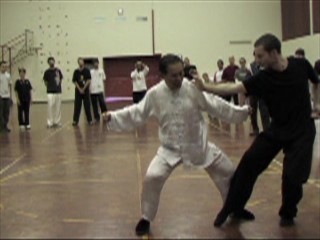
A common mistake many martial artists make while attacking is not covering themselves from possible counter-attacks from their opponent's guard hand. This applies not only at the start of an encounter, but also in the midst of an encounter.
Common Mistakes in Defence
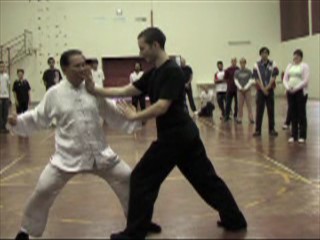
There are some common mistakes in defence. Although the defender has successfully blocked the attack, he often exposes himself in his defence. He also tenses his body, causing internal energy blockage. In his counter attack, he does not close or open the opponent to ensure his own safety first.
Weaknesses of Initiating Attack with High Kicks
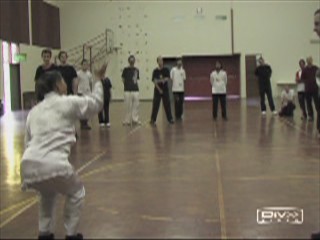
Initiating an attacking using high kicks gives away many disadvantages of the attacker to the opponent. The responder may just squart down and pluck the attack's groin, chop his standing leg, or push him over with a shoulder.
tWeaknesses of Boxers, Grapplers and Wrestlers
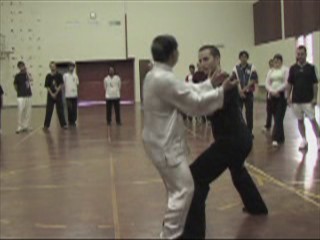
Boxers and Wrestlers give away many disadvantages of themselves to their opponents. As a Boxer attacks, you can kick at his groin which is normally unprotected. As a Grappler or Wrestler attacks, you can strike his head or body. These counter-attacks, however, are not permitted by safety rules in these martial sports.
The Three Internal Harmonies of Jing, Qi and Shen
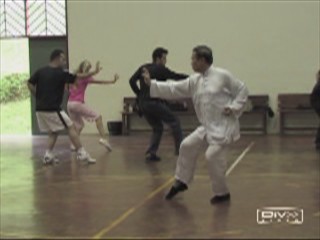
Combat is often a matter of seeking or creating advantages. The attacker and the responder adopt poise patterns for various advantages. The poise pattern provides the initiator the three internal harmonies of jing, qi and shen, or essence, energy and mind, before he starts combat. As he is going to initiate, it is his onus to adjust himself to a suitable spacing for attack.
Ensure Safety First while Attacking
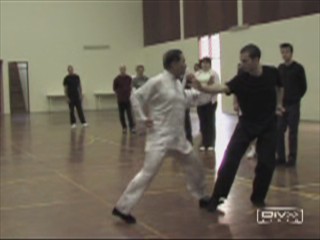
There are some innate weaknesses if you initiate an attack. To neutralize these weaknesses, you can “open” or “close” your opponent while attacking. But in the example shown here, Grandmaster Wong has purposely left one common weakness not taken care of. Do you know what it is? As usual, laughter is a frequent occurrence in Shaolin Wahnam training.
Avoid Exposing the Groin
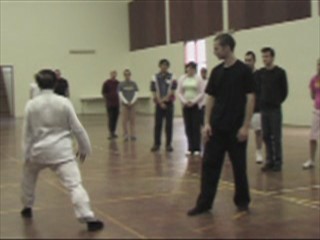
Many martial artists expose their groin when they move in to attack. They themselves are unaware of this weakness. Their opponents too are often unaware of this free-offer. When your groin is well protected, your opponent may still attack your groin, but he would have to make some footwork adjustment which gives you time to respond accordingly.
In-Gate, Out-Gate or Middle Approach
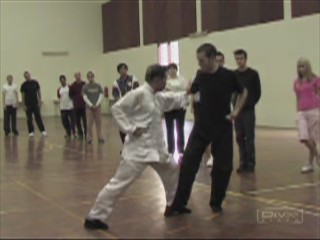
You may place your front foot outside his front foot, known as the out-gate approach, but it is difficult for him to kick you because your knee is guarding his leg. You may place your front foot in between his two feet, known as the in-gate approach. You may place it in front of his front foot (not shown here), or kick his front shin when moving in, known as the middle approach.
Ensuring Right Spacing while Attacking
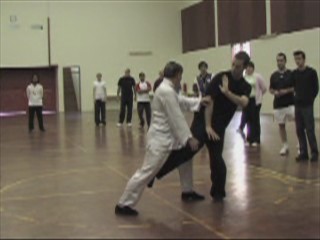
You must ensure your spacing is correct when attacking. If you are too close, you risk yourself to counter-attacks even before you start your attack. If you are too far, a common mistake made by many students, you cannot reach your target. You should be near enough to strike but far enough to be safe.
LINKS
Review of the Intensive Shaolin Kungfu Course in Sabah in March 2007
- Overview 1 : The Fundamentals
- Overview 2 : The 16 Combat Sequences
- Overview 3 : Are They Performing Kungfu Dance?
- The Basics of Shaolin Kungfu Training
- Fundamental Combat Skills
- Defeat you Hand to your Opponent, Victory you Create Yourself
- Avoiding Disadvantages and Seeking Advantages
- Basic Principles and Tactics of Combat
- Skills derived from Sparring can be Rewardingly used in Daily Life
- Some Secrets in Practicing Genuine Kungfu
-
Various Ways to Move into an Opponent
- Applying Combat Sequences in Sparring
- Linking Sequences to be More Combat Efficient
- The Secrets of Continuous Cannons
- The Mechanics of Continuation
- Marvelous Techniques Beget Marvelous Techniques
- Perfecting Forms and Developing Force
- Applying Tactics in Combat
-
Objectives of Form Training in Solo
- Being Fluent in Kicking Techniques before Applying them in Combat
- Using Tactics in Kicking Attacks and Defences
- Different Levels of Sophistication in Sparring and Fighting
- The Legacy of Uncle Righteousness: Secret of Continuous Cannons and their Counters
-
Benefiting from the Experiences and Teachings of Past Masters
- Poetic Patterns Can be Very Deadly
- Moving Back One Step when in Diffiuclt Situations
- Linking Sequences to Form a Kungfu Set
- Felling Techniques in Kungfu are Different from Judo and Wrestling
- Butterfly Palms and Hiding Flowers are Excellent in Countering Felling and Gripping Attacks
-
Let Mercy Flow from the Hands
- Benefits of Solo Set Practice — Combat Sequences 13 to 16
- From Pre-Choice Sequences to Free Sparring
- Applying Shaolin Patterns Correctly and Spontaneously in Free Sparring
- Shaolin Kungfu against Boxing and Kick-Boxing
- Shaolin Counters against Wrestling Shoots
- The Secret of Grandmaster Ho Fatt Nam
- Why Shaolin Kungfu is Technically Faster than Boxing
- Shaolin Techniques, Tactics and Strategies against Boxing
- Revealing Secrets of Past Taijiquan Masters
- Overwhelming Opponents with Just One Pattern
- Poetry and Elegance in Effective Combat
